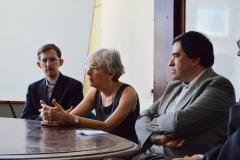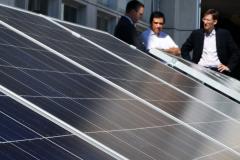-
Posts
6 -
Joined
-
Last visited
Contact Methods
-
Website URL
http://www.spirea.de
Profile Information
-
Location
Berlin, Germany
-
Interests
Climate Change, Renewable Energy, Latin America, Middle East, China, India
Recent Profile Visitors
3,278 profile views
Spirea Advisors's Achievements
-
Montevideo, Uruguay, December 12, 2015 German cleantech company Spirea GmbH, together with its local partner ERGO SRL have announced the completion of a pilot solar photovoltaic system of 5kWp for company Farolur S.A. in Laguna del Sauce, Maldonado, Uruguay. The project consists of the installation of 20 photovoltaic panels in the dairy farm and production complex of Farolur, located in the department of Maldonado (Ruta 12 Km 10, paraje Los Ceibos). The panels are connected to the network of UTE and will produce more than 6.000 kWh of green electricity per year, providing a clean energy source for use of the farm’s baby cow breeding and milking operations. Production exceeding consumption is not expected, but if any, it will be fed into the network of UTE under the micro-generation framework in Uruguay. The project is part of the worldwide “dena Renewable Energy Solutions Program” coordinated by Deutsche Energie-Agentur (dena) - the German Energy Agency - and co-financed by the German Federal Ministry for Economic Affairs and Energy (BMWi) within the “renewables – Made in Germany” initiative. German government has been actively supporting the world-wide dissemination of cutting-edge German renewable energy technology and know-how since 2002. The transfer of renewable energy expertise, the promotion of foreign trade and the facilitation of international development cooperation are part of the initiative. Supported by dena, the cleantech specialists at Spirea have chosen the agro-industrial complex Farolur S.A., owner of the diary product brand "Talar" for this project for its ecological commitment and self-sustaining business strategy. While the small solar plant is far from supplying the total energy need of Farolur, it is an important first step towards powering the agro-industrial complex with 100% green energy. It also allows the company to test the solar technology on a small scale and establish benchmarks for future expansion of the system. Dr. Utz Hoeser, Senior Partner at Spirea said: "Working with an environmentally responsible client such as Farolur has been a great pleasure to us. The company has a keen interest in clean technology and made strong commitments to the project from the very beginning. Dr. Yolanda Crujeira and her team at Farolur are continuously seeking excellence in both end products and production process, and consider clean energy as an important part of Talar’s quality process. Beyond financial and economic benefits that can be realized for corporate owner of a well-designed commercial PV system, we believe that the biggest value of this project is contributing to Farolur’s vision of powering the farm with 100% clean energy." About Spirea GmbH: Spirea Advisors is an independent cleantech consultant based in Berlin, Germany. The young boutique focuses on facilitating cleantech investment and cooperation around the globe. Since its establishment in 2011, Spirea has completed various successful projects across Asia, Middle East and Latin America. Spirea is the key implementation partner of the solar PV system at Farolur under the dena-RES-Project 2014/2015, and is positioned to play an active role in the Uruguayan cleantech market. www.spirea.de About Talar / Farolur S.A.: Farolur is an agro-industrial complex engaged in the production of dairy products of the highest quality for the domestic consumption and export supply. Unites tradition in the craftsmanship of dairy products, a modern production system that meets the most demanding national and international standards in this industry has been established. The farm produces with the mode "full-cycle" so that the traceability of the final product can be monitored from the crops that feed the cows. The natural balance of the eco system is one of the permanent concerns of the Talar brand: producing its own energy, returning nutrients to the land, returning water to its natural cycle, recycling wastes, sewage and emission without impacting the environment. Another continuous effort at Talar is ensuring welfare of all animals: a balanced nutrition and professional cares, providing cows with a quiet life without stress, resulting in better milk products. www.marcatalar.com About ERGO SRL: ERGO is a Company founded and managed by specialists in energy efficiency and renewable energies. In this field, ERGO is specialized in turnkey photovoltaic projects and assessing clients in electricity generation projects of all kinds. www.ergo.com.uy About dena: The Deutsche Energie-Agentur (dena) - the German Energy Agency - is Germany's centre of expertise for energy efficiency, renewable energy sources and intelligent energy systems. dena's aim is to ensure that energy is used in both a national and international context as efficiently, safely and economically as possible with the least possible impact on climate. dena is working with stakeholders from the worlds of politics and business and from society at large to achieve this aim. Shareholders in dena are the Federal Republic of Germany, KfW Bankengruppe, Allianz SE, Deutsche Bank AG and DZ BANK AG. www.dena.de
-
Spirea Advisors changed their profile photo
-
Montevideo, Uruguay, December 12, 2015 The Climate talks in Paris are marking a turning point for human history and solar energy plays an important role in it. The history is not repeating itself: in contrast to the climate talks in Copenhagen 2009 which ended as a huge failure, the 2015 negotiations in Paris will remain in history as a success and a starting point into a new era. This first time mankind, the world takes a united stance in actively managing greenhouse gas emissions. The first time the majority of countries commit to reduce global greenhouse gas emissions on an absolute level and commit toward a complete decarbonisation of the energy supply. Solar energy is playing a central part in this transformation. Continuously declining system costs have already made solar energy the most competitive energy source including both renewable and non-renewable energy sources. Uruguay has been one of the global front runners in this development. With its proactive approach in promoting renewable energies, including hydro power, solar and wind, Uruguay has achieved a remarkable renewable share of the electricity supply of over 90%, mainly due to its hydroelectric power and recently installed Eolic parks. With this progress Uruguay is also the global front runner in transforming its economy into a low carbon economy. Compared to 2009 Uruguay has pledged at the United Nations climate talks to cut its emission level by 2017 by over 88%. At a recent event at the Engineering Faculty of the University of the Republic (UdelaR) in Montevideo, where the German Energy Agency (dena) and German cleantech company Spirea GmbH sponsored an experimental photovoltaic system to the university, speakers including faculty dean Prof. Dr. Simon, director of the electrical institute Prof. Dr. Silveira, and German embassy counselor Dr. Teepe were all happy to point the progress Uruguay has made in turning its electricity green. But the story does not end there. For cars, buses and trucks Uruguay is still using mostly fossil fuels. Gas is still a main source for heating. Backup electricity production is still based on fuel oil. In the future, with the increasing electrification of public and private transport, Uruguay has the potential for a 100% renewable energy supply. The storage of renewable energy and charging station for electric vehicles will be key elements to getting there. As the dean of the engineering faculty at UdelaR, Prof. Dr. Maria Simon, pointed out during the recent event that, the country’s huge clean power generation potential through decentralized solar PV system from both private households and small commercial businesses has not yet been exploited. In combination with available tax incentives and high peak time electricity prices, PV solar systems can in some cases be used with significant energy cost saving and attractive investment return already. However, in many cases, a fast roll-out of decentralized PV solutions in Uruguay will depend on three key factors: 1. Innovative financing schemes. For most private households in Uruguay it is unaffordable to install a PV solar system with full upfront payment. There's no pre-approved credit scheme available on the market for residential PV system, like the ones for thermal solar system. The same applies for commercial users who have to rely on traditional bank loans that weigh heavily on their balance sheets due to the high lending rate. Standardized, pre-approved installment schemes will make decentralized PV system much more attractive for low-tension users in Uruguay. 2. Long term vision of utility company. Despite of the regulator's efforts of introducing net-metering mechanism and international PV tenders, Uruguay’s government-owned power company UTE is still the dominated player in both generation & transmission. Its future can already be seen in Germany and the USA, where vertically integrated players are continuously losing end-customers to innovate new entrants such as Solar City. The tipping point for Uruguay may be a few years away, but the monopoly position of UTE can definitely not hold the tide back once it makes more economic sense for end users to install their own solar panels and battery systems. 3. Economy of scale. In the long run, the learning effect and market competition will ultimately drive the prices of PV system down in the country, as we have seen in Germany. Nevertheless, as a young industry in Uruguay, the installation and connection cost is still at the higher end for most decentralized low-tension PV systems. High cost means less customer and a smaller cake for all market players. It is a problem of chicken and egg. One potential solution to the dilemma is to bring in experienced foreign solar companies and investments from outside the country. By utilizing its rich hydro, solar and wind resources and becoming one of the first 100%-renewable countries in the world, Uruguay can once again show its leadership and function as a global role model in combating the climate change. Decentralized solar PV system will play an essential role in Uruguay’s strategic road-map towards a zero-emission power supply matrix. The bottlenecks faced by the young market shall be unlocked by joint efforts of regulators, local entrepreneurs and international players. Backed by one of the most stable and strong-growing economies on the continent, the untapped residential and commercial PV market in Uruguay represents a brilliant opportunity for global businesses and investors. You can find more details about the pilot project at FING at www.spirea.de/fing/
-
Spirea Advisors joined the community
-
MONTEVIDEO, Uruguay, 10th December 2015 German company Spirea GmbH, together with its local partner ERGO SRL have announced the installation and connection of a pilot solar photovoltaic system of 2kWp for the Faculty of Engineering (FING) at the University of the Republic in Montevideo, Uruguay. The project consists of the installation of 8 photovoltaic panels with micro inverters at rooftop of the Institute of Electrical Engineering, located in Parque Rodó. The system is connected to the network of UTE and will produce approximately 2800 kWh of electricity per year, contributing clean energy for use in the faculty. Beyond a green source of electricity supply, the main objective of the project is to allow the students and researchers of FING perform experiments and tests with a photovoltaic system in daily operation. Power production exceeding consumption of the faculty building is not expected, but if any, it will be fed into the network of UTE in the framework of micro-generation introduced by Uruguayan power regulators. The project is part of the worldwide “dena Renewable Energy Solutions Program” coordinated by Deutsche Energie-Agentur (dena) - the German Energy Agency - and co-financed by the German Federal Ministry for Economic Affairs and Energy (BMWi) within the “renewables – Made in Germany“ initiative. It is the official aim of the German government to make a significant contribution to international climate protection. Therefore, the government has been actively supporting the world-wide dissemination of cutting-edge German renewable energy technology and know-how since 2002. The transfer of renewable energy expertise, the promotion of foreign trade and the facilitation of international development cooperation are part of the initiative. The German company Spirea GmbH, supported by dena, has chosen the Faculty of Engineering for this project because of its key role in shaping future generations of professionals in the renewable energy sector. As the faculty consists of the country most prestigious engineers, the Faculty of Engineering is also a key actor in the transformation of Uruguay’s energy matrix. Dr. Utz Hoeser, Spirea Partner GmbH said: "It is an honor for our firm to work with the prestigious Faculty of Engineering who has showed strong interests and commitment in realizing this experimental PV system at the faculty building. Continuous supports from the faculty dean Prof. Dr. Simon, director of the Electrical Engineering Institute Prof. Dr. Silveira and project leader Mr. Adrian Santos made the project possible. The initial project idea was born from contact with the faculty alumni Lic. Enzo Melani and Lic. Mauro Melani, both are directors at company ERGO and active in the Uruguayan renewable energy sector." About Spirea GmbH: Spirea Advisors is an independent cleantech consultant based in Berlin, Germany. The young boutique focuses on facilitating cleantech investment and cooperation around the globe. Since its establishment in 2011, Spirea has completed various successful projects across Asia, Europe and the Middle East. Spirea is the key implementation partner of the solar PV system at FING under the dena-RES-Project 2014/2015, and is positioned to play an active role in the Uruguayan cleantech market. www.spirea.de About FING: The Faculty of Engineering of the University Republic (Universidad de la República) is the only public institution of higher education in engineering in Uruguay. Its aim is to train skilled professionals to meet the needs and demands of the industrial sector and contribute to the development of the society. This faculty was established on July 14, 1885 as Faculty of Mathematics and Associated Fields, and changed its name after the 1975 resolution by Minister of Education and Culture to the name by which we know it today. www.fing.edu.uy About ERGO SRL: ERGO is a Company founded and managed by specialists in energy efficiency and renewable energies. In this field, ERGO is specialized in turnkey photovoltaic projects and assessing clients in electricity generation projects of all kinds. www.ergo.com.uy About dena: The Deutsche Energie-Agentur (dena) - the German Energy Agency - is Germany's centre of expertise for energy efficiency, renewable energy sources and intelligent energy systems. dena's aim is to ensure that energy is used in both a national and international context as efficiently, safely and economically as possible with the least possible impact on climate. dena is working with stakeholders from the worlds of politics and business and from society at large to achieve this aim. Shareholders in dena are the Federal Republic of Germany, KfW Bankengruppe, Allianz SE, Deutsche Bank AG and DZ BANK AG. www.dena.de




